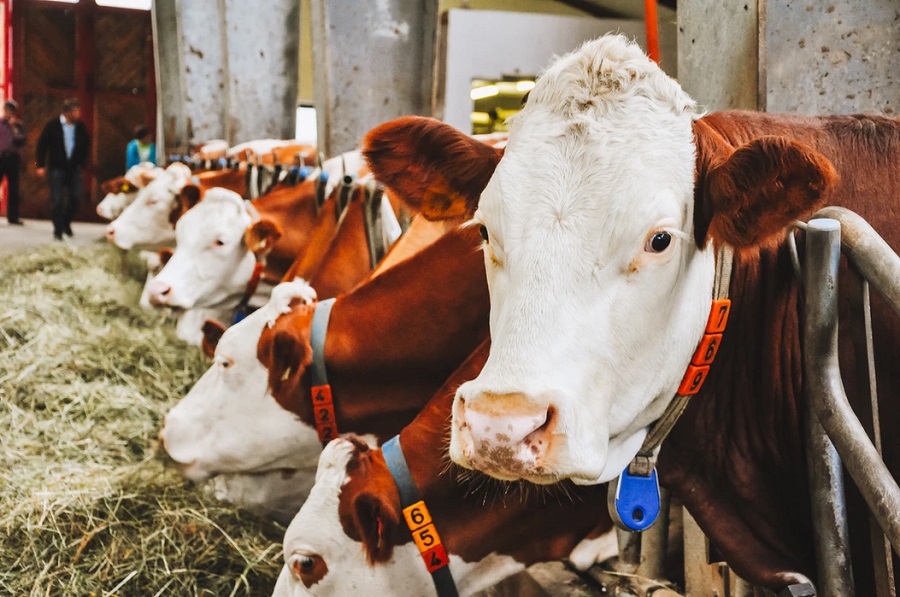Post-Brexit would strengthen trade ties with the US which could force the UK’s meat and dairy industries to spiral into abusive practices.
The world’s largest conservation organisation has warned of an ‘unedifying race to the bottom’ in food standards if British farmers are forced to compete with inferior foreign imports.
The World Wildlife Fund for Nature (WWF-UK) has thrown its support behind The Mail on Sunday’s campaign to protect welfare and environmental practices in the post-Brexit trade deal with the US.
Chief executive Tanya Steele said a failure to ban low-standard imports would lead to the ‘driving down of environmental standards, the decimation of our farming community and our natural environment’. She added: ‘In opening our borders to imports without legal protection to ensure they do not undermine our own higher environmental standards, we’d contribute to environmental and health problems overseas and force British farmers to make a terrible choice.
There are fears that the UK could be flooded with mass-produced chlorine-washed chicken and beef pumped full of hormones.
‘Namely, to compete in an unedifying race to the bottom or go out of business.’ There are fears that the UK could be flooded with mass-produced chlorine-washed chicken and beef pumped full of hormones. Both practices are rife in the US but have been banned for decades in the EU. Environment Secretary George Eustice has previously called animal welfare law in the US ‘woefully deficient’ and Ministers have repeatedly said they will not undermine current standards in any trade deals.
The WWF-UK has added its voice to this newspaper’s Save Our Family Farms campaign, with Ms Steele warning about the horrors of ‘industrial-scale mega-farms’. She highlighted the fact that in the US there are ‘vast sheds filled with tens of thousands of pigs, cows and sheep crammed together in poor conditions and raised to produce cheap meat at incredible quantities, using methods and in conditions which we don’t currently allow in the UK’. One pig farm in Missouri, she said, has permission to house 79,488 animals – making it around 346 per cent larger than the biggest pig farm in the UK. It’s a breathtaking scale – Old Trafford holds 74,879 people. ‘Currently, we have protections that stop UK farms from becoming so large they cause environmental damage from air, water and land pollution’.
In a country, the size of the UK, dealing with the environmental impacts of industrial-scale farming out of sight and smell of human habitation would be a tall order. Huge industrial farms packed with animals could spring up ever closer to our towns and villages, bringing with them the risk of air and water contamination that has been well documented across the Atlantic.
Chief executive Tanya Steele, said a failure to ban low-standard imports in a post-Brexit trade deal with the US would lead to the ‘driving down of environmental standards’
‘But if we allow a flood of cheap, intensively produced, hormone-treated meat from the US, the only way our farmers could compete on price is to vastly increase their production – leading to the creation of our own mega-farms. This would mean either abandoning basic environmental and welfare standards or keeping our protections in place, which would then price British farmers out.’
A petition launched by the National Farmers’ Union and backed by The Mail on Sunday to demand that food be produced to world-leading standards has so far attracted more than one million signatures. The WWF-UK is also running a Don’t Trade Our Planet campaign, which calls on the Government to enshrine in law a commitment to importing foods that do not rely on unsustainable farming, the destruction of nature and animals being kept in disease-ridden conditions.
Forcing our farmers at home to compete with cheap imports by increasing intensive production would mean dire consequences for British wildlife habitats and for our health, says WWF-UK chief executive Tanya Steele. Ms Steele added: ‘Ultimately if our farmers can’t compete, they will lose their livelihoods and have to sell up – leaving only the biggest corporate farms with animals kept indoors and fed on imported soy able to operate in the UK. It would destroy the landscapes that have been nurtured by farming families for generations.’
We have found ourselves reconnecting with the nature around us, and watched as nature has reclaimed some of our spaces while we have been absent. We have learned to value its importance in our lives.
In the last four months, as our lives have been lived mostly indoors and normality has paused, we have found moments of enjoyment in the simple things. We have found ourselves reconnecting with the nature around us, and watched as nature has reclaimed some of our spaces while we have been absent. We have learned to value its importance in our lives, and many of us have talked of the need to hold onto that as life returns to whatever ‘normal’ means.
The roots of this pandemic have also shone a light on the way we are fundamentally connected with nature, and that what happens on one side of the world can devastate lives on the other. And yet as the country rebuilds from the ravages of this health crisis while also trying to forge its independent path in the world, the decisions we make could affect our natural environment for many years to come.
Original source: https://www.dailymail.co.uk

